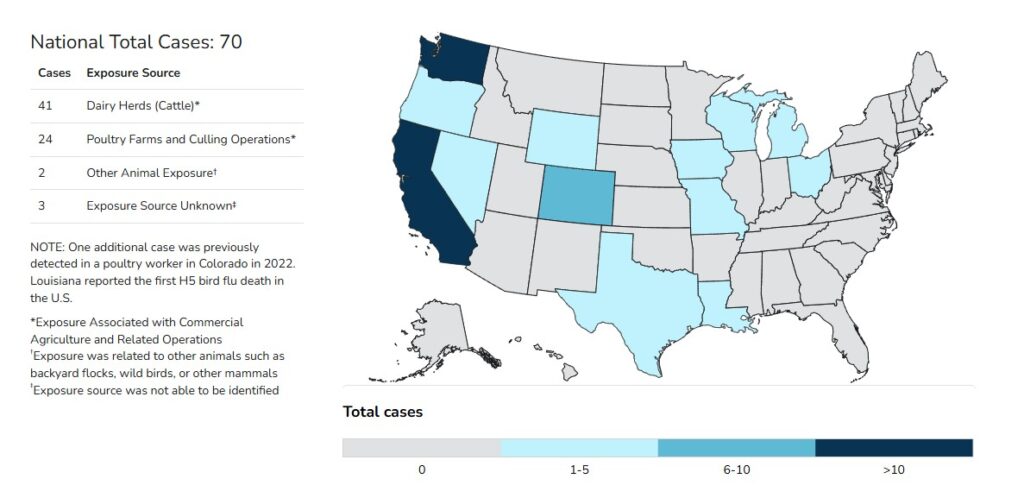Highly pathogenic avian influenza (HPAI), or bird flu, primarily affects wild and domesticated birds. However, strains such as H5N1 can infect other animals (such as cows) and humans. Compared to other people, farm workers are more susceptible to HPAI infection because they work closely with animals. Still, it’s important to avoid overstating the risk.
What’s the Risk?
To date, there is no evidence of sustained bird flu transmission in humans. When transmission does occur, it’s sporadic instead. Bird flu fatalities have occurred, but they are rare in places with strong public health systems. In the United States, there has been only one confirmed death from H5N1 and a total of 70 confirmed and probable cases between 2024 and today (April 9, 2025).
Globally, the H5N1 strain has a mortality rate of around 50% in humans. Most of these cases have been in Asia, Africa, and the Middle East, but that hasn’t stopped the United States from culling over 148 million chickens since 2022. Recently, Health and Human Services (HHS) Secretary Robert F. Kennedy, Jr. proposed a policy change that would let bird flu spread on farms to increase immunity.
How Does Bird Flu Spread to Farm Workers?
There are several ways that bird flu can spread to farm workers, the people who are most susceptible to transmission. The first is direct contact with infected animals, as happened to a Colorado worker who acquired and then recovered from the virus in 2022. Yet transmission can also occur through exposure to bird excrement, feathers, or secretions, or from herds of dairy cows.
There are other ways that humans can become infected as well. Farm workers may touch tools, cages, vehicles, or clothing that is contaminated with the virus and then touch their faces, eyes, or mouths. Aerosol transmission is possible, but it’s less common. In enclosed spaces like poultry houses, farm workers may inhale small virus-containing particles in dust or droplets.
How is Bird Flu Treated in Humans?
There is no specific vaccine for bird flu, and the seasonal flu vaccine does not protect humans against it. Antiviral medications like oseltamivir (Tamiflu) and zanamivir (Relenza) can be used to treat bird flu in people, however. They work by stopping the flu virus from spreading throughout the body and are most effective when taken soon after symptoms begin.
According to the U.S. Centers for Disease Control (CDC), people with compromised immune systems are at a higher risk of severe illness from avian influenza. However, these same people are also unlikely to be engaged in farm work, which is rigorous and physically demanding. Given the U.S. government’s track record on COVID-19, Go Natural Education encourages you to decide for yourself whether there’s a risk of another pandemic.
